(完整版)译林牛津英语8上英语知识点(新)
牛津译林版八年级上册(1——8单元)期末必考知识点复习
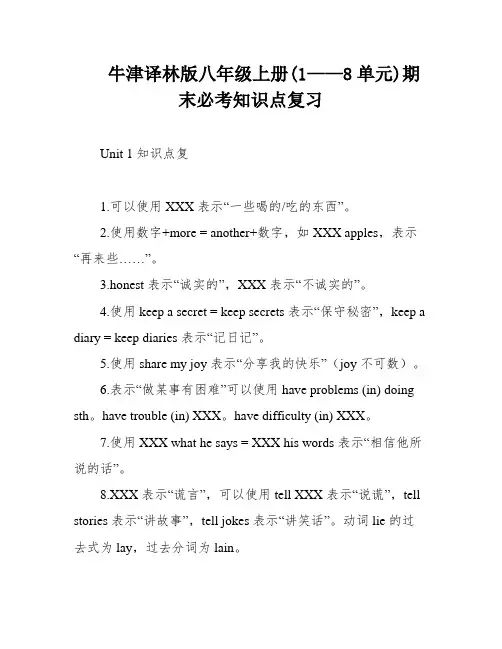
牛津译林版八年级上册(1——8单元)期末必考知识点复习Unit 1 知识点复1.可以使用 XXX 表示“一些喝的/吃的东西”。
2.使用数字+more = another+数字,如 XXX apples,表示“再来些……”。
3.honest 表示“诚实的”,XXX 表示“不诚实的”。
4.使用 keep a secret = keep secrets 表示“保守秘密”,keep a diary = keep diaries 表示“记日记”。
5.使用 share my joy 表示“分享我的快乐”(joy 不可数)。
6.表示“做某事有困难”可以使用 have problems (in) doing sth。
have trouble (in) XXX。
have difficulty (in) XXX。
7.使用 XXX what he says = XXX his words 表示“相信他所说的话”。
8.XXX 表示“谎言”,可以使用 tell XXX 表示“说谎”,tell stories 表示“讲故事”,tell jokes 表示“讲笑话”。
动词 lie 的过去式为 lay,过去分词为 lain。
9.interesting 修饰物,表示“令人感到有趣的”;interested修饰人,表示“对……感兴趣的”。
例如:That interesting old man came to our school every day.(那个有趣的老人天天到我们学校来。
)An XXX.(一位感兴趣的外国人来参观我们学校。
)This book is XXX.(这本书在我看来很有趣。
)I’m XXX book.(我对这本书很感兴趣。
)1) Good friends should not only be kind and supportive。
but also XXX。
2) Max is such an intriguing person.3) XXX is also one of the XXX class.4) My sister has short hair。
牛津译林版八年级上册英语 Unit 1-Unit 8 语法知识点总结汇编
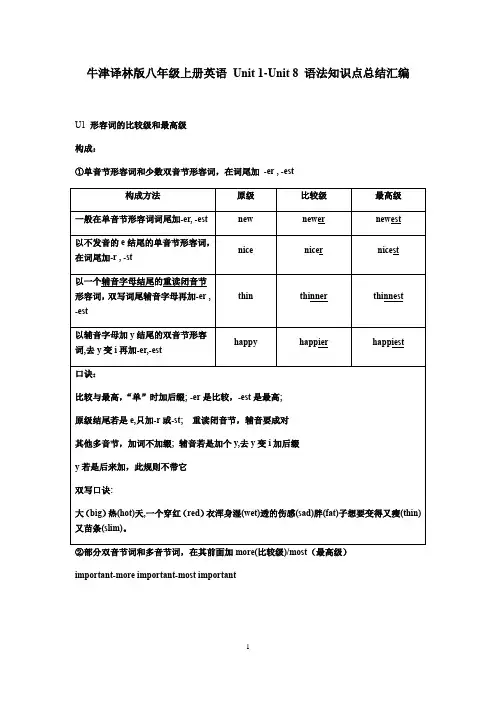
牛津译林版八年级上册英语Unit 1-Unit 8 语法知识点总结汇编U1 形容词的比较级和最高级构成:①单音节形容词和少数双音节形容词,在词尾加-er , -est②部分双音节词和多音节词,在其前面加more(比较级)/most(最高级)important-more important-most important③不规则变化形容词比较级的用法:形容词最高级的用法★最高级和比较级同义句转换:Li Lei is the tallest student in his class.=Li Lei is taller than any other student/the other students/the others in his class.►形容词最高级前若有不定冠词a 表示“非常”Spring is a best season.春天是一个非常好的季节。
U2 ◎数量的比较一、两者数量的比较1.用“more... than. . .”结构表示“...比...多”,more+可名复/不可名。
You have more books than I.你的书比我的多I have more free time than you.我的空余时间比你的多。
2.用“fewer/less... than..."结构表示“......比....少”,fewer+可名复,less+不可名。
Our school has fewer weeks off for the summer holiday than yours.我们学校比你们学校的暑假少放几个星期。
He spends less money on clothes than I.他在衣服上花的钱比我少。
二、三者或三者以上的数量上的比较1.用“the most”表示“最多”,most+可名复/不可名We study the most subjects of all.在所有人当中我们学习的科目最多。
(完整word)新牛津译林版八年级上8A-Unit1-8语法总结,推荐文档
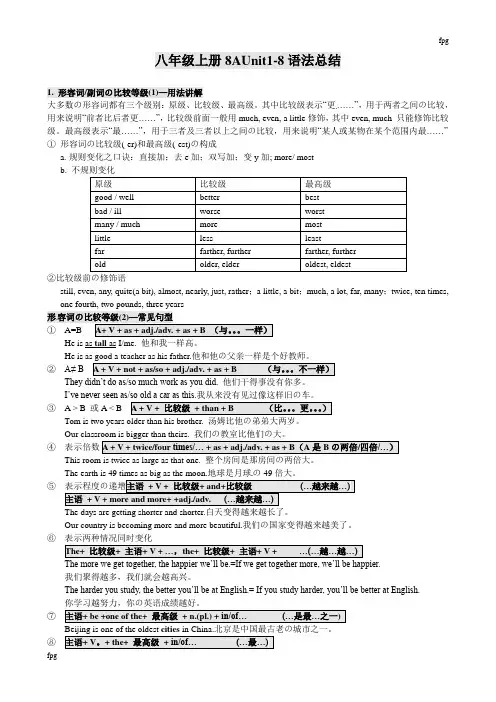
八年级上册8AUnit1-8语法总结1. 形容词/副词の比较等级(1)—用法讲解大多数の形容词都有三个级别:原级、比较级、最高级。
其中比较级表示“更……”,用于两者之间の比较,用来说明“前者比后者更……”,比较级前面一般用much, even, a little修饰,其中even, much 只能修饰比较级。
最高级表示“最……”,用于三者及三者以上之间の比较,用来说明“某人或某物在某个范围内最……”①形容词の比较级(-er)和最高级(-est)の构成a.规则变化之口诀:直接加;去e加;双写加;变y加; more/ mostb. 不规则变化原级比较级最高级good / well better bestbad / ill worse worstmany / much more mostlittle less leastfar farther, further farther, furtherold older, elder oldest, eldest②比较级前の修饰语still, even, any, quite(a bit), almost, nearly, just, rather;a little, a bit;much, a lot, far, many;twice, ten times, one fourth, two pounds, three years形容词の比较等级(2)—常见句型①A=B A+ V + as + adj./adv. + as + B (与。
一样)He is as tall as I/me. 他和我一样高。
②A≠ B A + V + not + as/so + adj./adv. + as + B (与。
不一样)They didn’t do as/so much work as you did. 他们干得事没有你多。
③ A > B 或A < B A + V + 比较级+ than + B (比。
牛津译林版八年级英语上册Unit1知识点讲解
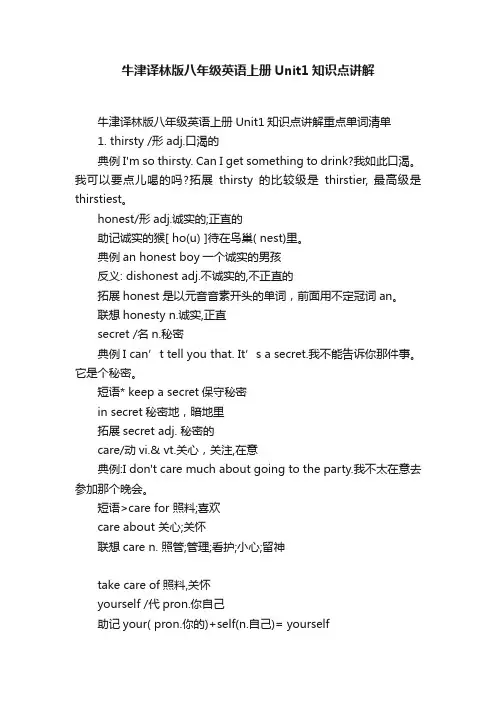
牛津译林版八年级英语上册Unit1知识点讲解牛津译林版八年级英语上册Unit1知识点讲解重点单词清单1. thirsty /形adj.口渴的典例I'm so thirsty. Can I get something to drink?我如此口渴。
我可以要点儿喝的吗?拓展thirsty的比较级是thirstier, 最高级是thirstiest。
honest/形adj.诚实的;正直的助记诚实的猴[ ho(u) ]待在鸟巢( nest)里。
典例an honest boy一个诚实的男孩反义: dishonest adj.不诚实的,不正直的拓展honest是以元音音素开头的单词,前面用不定冠词an。
联想honesty n.诚实,正直secret /名n.秘密典例I can’t tell you that. It’s a secret.我不能告诉你那件事。
它是个秘密。
短语* keep a secret保守秘密in secret秘密地,暗地里拓展secret adj. 秘密的care/动vi.& vt.关心,关注,在意典例:I don't care much about going to the party.我不太在意去参加那个晚会。
短语>care for 照料;喜欢care about 关心;关怀联想care n. 照管;管理;看护;小心;留神take care of照料,关怀yourself /代pron.你自己助记your( pron.你的)+self(n.自己)= yourself典例Help yourself to some fish, Ann.安,请随便吃些鱼吧。
短语*enjoy yourself玩得开心by yourself独自地,独立地help yourself to... 请随便吃拓展yourself的复数形式为yourselves.6.magazine/n.杂志典例read many kinds of magazines拓展英语中“看”的不同表达(看书read a book看电影see/ watch a film看电视watch TV看黑板look at the blackboard看医生see the doctor看窗外look out of the window7. good-looking /形adj.好看的,漂亮的助记> good( adj.好的) +looking( adj.●.....相貌的)= good-looking典例>Lucy is a good-looking girl.露西是-个漂亮的姑娘。
牛津译林版八年级上册英语 Unit 1-4 知识点总结复习提纲
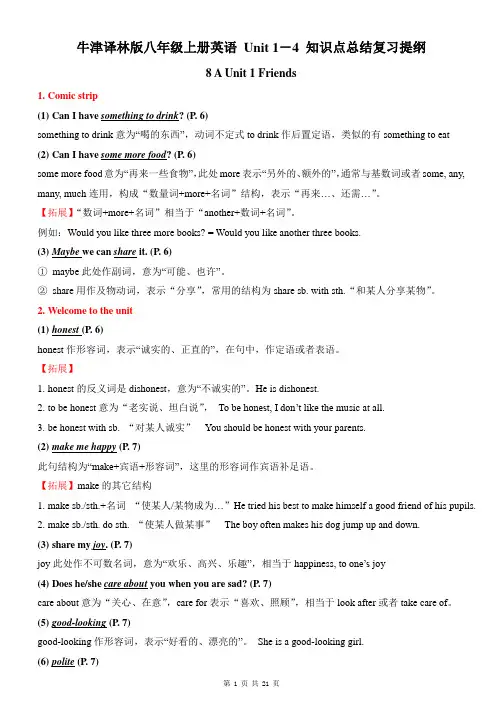
牛津译林版八年级上册英语Unit 1-4 知识点总结复习提纲8 A Unit 1 Friendsic strip(1)Can I have something to drink? (P. 6)something to drink意为“喝的东西”,动词不定式to drink作后置定语,类似的有something to eat (2)Can I have some more food? (P. 6)some more food意为“再来一些食物”,此处more表示“另外的、额外的”,通常与基数词或者some, any, many, much连用,构成“数量词+more+名词”结构,表示“再来…、还需…”。
【拓展】“数词+more+名词”相当于“another+数词+名词”。
例如:Would you like three more books? = Would you like another three books.(3)Maybe we can share it. (P. 6)①maybe此处作副词,意为“可能、也许”。
②share用作及物动词,表示“分享”,常用的结构为share sb. with sth.“和某人分享某物”。
2.Welcome to the unit(1)honest (P. 6)honest作形容词,表示“诚实的、正直的”,在句中,作定语或者表语。
【拓展】1.honest的反义词是dishonest,意为“不诚实的”。
He is dishonest.2.to be honest意为“老实说、坦白说”,To be honest, I don’t like the music at all.3.be honest with sb. “对某人诚实”You should be honest with your parents.(2)make me happy (P. 7)此句结构为“make+宾语+形容词”,这里的形容词作宾语补足语。
译林版英语八年级上册语法汇总
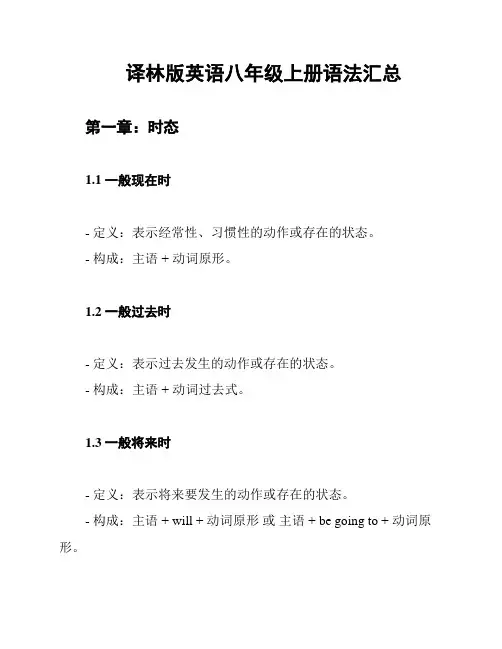
译林版英语八年级上册语法汇总第一章:时态1.1 一般现在时- 定义:表示经常性、习惯性的动作或存在的状态。
- 构成:主语 + 动词原形。
1.2 一般过去时- 定义:表示过去发生的动作或存在的状态。
- 构成:主语 + 动词过去式。
1.3 一般将来时- 定义:表示将来要发生的动作或存在的状态。
- 构成:主语 + will + 动词原形或主语 + be going to + 动词原形。
第二章:被动语态2.1 被动语态的构成- 一般现在时:主语 + am/is/are + 过去分词 + by + 动作执行者。
- 一般过去时:主语 + was/were + 过去分词 + by + 动作执行者。
- 一般将来时:主语 + will be + 过去分词 + by + 动作执行者。
2.2 被动语态的用法- 强调动作的承受者而非执行者。
- 在没有明确动作执行者的情况下使用。
第三章:情态动词3.1 can- 定义:表示能力、可能性、请求或允许。
- 构成:主语 + can + 动词原形。
3.2 may- 定义:表示可能性、请求或允许。
- 构成:主语 + may + 动词原形。
3.3 must- 定义:表示必须、肯定或推测。
- 构成:主语 + must + 动词原形。
- 否定:主语 + must not + 动词原形。
3.4 shall- 定义:表示承诺、警告或征求对方意见。
- 构成:主语 + shall + 动词原形。
3.5 will- 定义:表示意志、承诺或将来事实。
- 构成:主语 + will + 动词原形。
第四章:代词4.1 人称代词- 主格:I, you, he, she, it, we, they。
- 宾格:me, you, him, her, it, us, them。
4.2 物主代词- 形容词性:my, your, his, her, its, our, their。
- 名词性:mine, yours, his, hers, its, ours, theirs。
牛津译林版八年级英语上册 8A U1 -8 知识点
牛津译林版八年级英语上册8A U1 -8 知识点校对版8A Unit 1 Friends!Comic Strip&Welcome to the unit1.something to drink/eat 一些喝的/吃的东西2. two more apples = another two apples 再来2个苹果3. 1)There’s nothing else in the fridge. 冰箱里没有别的东西了。
2)What else did he say? 他还说了些什么?句中else的意思是“此外、别的”,常用于不定代词或副词、疑问代词或副词之后。
4.不定代词something/anything/nothing/everythingsomebody/anybody/nobody/everybodysomeone/anyone/no one/everyone1) 不定代词作主语,谓语用单数。
eg: 每个人都在这儿。
Everyone is here.2)形容词修饰不定代词,放在不定代词的后面。
eg: 我喜欢有趣的东西。
I like something interesting.5.What about doing sth? 做某事怎么样啊?6.share sth with sb 与某人分享某物7.辨析maybe & may beHe may be in the office.= Maybe he is in the office. 他或许在办公室。
8.an honest boy 一个诚实的男孩 a dishonest boy 一个不诚实的男孩9.keep a secret 保守秘密10.care about sb 关心某人11.talk to sb about sth 和某人谈论某事12.be ready to do sth = be willing to do sth 乐意做某事13.believe what he says 相信他说的话14.be polite to sb 对某人有礼貌impolite adj 不礼貌的15.tell lies 说谎tell funny jokes 讲好笑的笑话Reading1.one of + adj. (最高级) + n. (复数) ....之一2.be willing to do sth = be ready to do sth乐意做某事3.share sth with sb 和某人分享某物4.help sb do sth = help sb with sth 帮助某人做某事5.give one’s seat on the bus to the people in need 在公交上将座位让给需要的人6.have a good voice 有一副好嗓音7.grow up 长大8.make sb do sth 使某人做某事9.have a good sense of humor 有幽默感10.walk past my desk = pass my desk 经过我的桌子11.knock sth onto the the floor 将某物碰到地上12.say a bad word about sb 说某人的坏话13.keep a secret 保守秘密14.be kind/nice/friendly to sb 对某人友好15.be good at doing sth 擅长做某事Grammar1.height n. 高度what is your height? 你身高多少?2.weight n. 重量what is your weight? 你体重多少?3.辨析among & betweenamong 强调在三者或者三者以上之间between 强调在两者之间,常用于短语between...and...Integrated skills& Task1.listen to people carefully 认真听人们说2.be famous to 为...所熟知be famous as 作为...而出名be famous for 因为...而出名3.make friends with sb. 和某人交朋友4.talk about our future plans 谈论我们的未来计划5.want to do sth = would like to do sth 想要做某事6.be kind to sb. 对某人很好be friendly to sb.对某人友好7.travel around the world 环游世界8.learn more about... 了解更多关于...9.what be sb like ? 问某人的品格what do(does) sb. look like? 问某人的长相what do(does) sb. like? 问某人喜欢什么10. smile v.& n. 微笑adj. smiling 微笑的smiling eyes 带有笑意的眼睛wear/have a smile on one’s face 面带微笑10.patient n. 病人adj.有耐心的impatient adj. 没有耐心的11.make an excellent teacher 成为一名优秀的教师12. 形容词中比较级和最高级需要双写最后一个字母,再加er/est大(big)热(hot)天,一个穿红(red)衣浑身湿(wet)透的伤感(sad)胖(fat)子想要变得又瘦(thin)又苗条(slim)语法形容词比较级和最高级形容词有原级、比较级和最高级三种形式。
牛津译林版八年级上英语知识点总结
牛津译林版八年级上英语知识点总结8A unit1Friends1、something to eat/drink吃的东西/喝的东西2、some more food再来一些食物two more days = another two days3、maybe可能,也许(句首)may be也许是(句中)4、share sth with sb = share sb sth与某人分享某物5、honest诚实的dishonest不诚实的6、keep a secret保守秘密7、make sb + adj(happy/sad)make sb/sth do sth8、joy = happiness不可数名词9、care about关心10、help oneself to随便吃11、polite礼貌的impolite不礼貌的12、tidy整齐的untidy不整齐的13、tell lies/tell a lie说谎14、play a joke on sb取笑某人15、come true完成18、help sb with/do/to do sth帮助某人做某事19、voice嗓音noise喧华声,喧嚣声sound声音20、a sense of humour幽默感21、knock into sb撞在某人身上22、choose to do sth选择做某事23、height高度adj为high高的put on weight增肥lose weight减肥25、among强调在三者或三者以上之间26、plan to do sth计划做某事27、what’s sb like?用于讯问或人的性情、品质等what does sb like?用于询问某人的喜好what does sb look like?用于询问某人的外貌28、with带有,具有29、fat----- fatter------fattest30、patient耐心的impatient不耐心的31、in need需要32、be kind to sb对某人友好33、any time在任何时候34、knock..onto把...撞....35、say a bad word about sb.说某人的坏话36、talk about谈论37、social worker社会工作者38、grow up长大,成长39、next to挨着40、What about +n./v. -ing? (做) ...怎.么样?41、be good at+n./v.-ing擅长(做)某事42、would like to do sth.想做某事18A unit2 School life1、have to不能不、必需三单方式:has to曩昔时态:had to未来时态:will have to2、hard努力地比力级harderIt’s raining hard. Hard意为大量地、辛苦地3、a little大批,一点儿透露表现一定意义little很少,几乎没有表示否定意义a few有几个,有一些透露表现一定意义few没有几个,几乎没有表示否定意义4、go on vacation去度假5、提发起的经常使用句型:①Could/Would you please do sth.?请你做某事好吗?②Shall we/I do sth.?我们/我做某事好吗?③Let's do sth.咱们做某事吧。
Unit2重要知识点牛津译林版英语八年级上册
8A U2【wele】1.have to &must[have to]:“必须,不得不”,强调客观上的需要,有人称,时态的变化(三单has to,过去式had to,将来时will have to),其否定形式为don't/doesn’t/didn’t have to,表示“不必”[must]:“必须”,强调主观意愿和看法,无人称,时态和数的变化,其否定形式为mustn't,表示“禁止,不允许”2.It's like watching TV,but there are fewer advertisements.它(上学)就像看电视,只不过广告少一些。
①like prep.像... +名词/代词/ving②fewfewer +可名复③few ;a few;little;a little区别3.British n.英国人the British=British people=Englishmanadj.英国的British people4.vacation 可数名词/不可数名词“假期”(英:holiday)on vacation在度假take a vacation度假winter/summer vacation寒假/暑假5.fall n秋天(英:Autumn);瀑布vi.落下;跌倒6.movie n.(可数) 电影(英:film)go to a movie/go to the movie看电影6.Shall we go together?“Shall we do......?”提建议的句型➡肯定回答:Why not?/OK./Of course./All right.【提建议的句型】Let’s do sth.You'd better do sth.(你最好做某事)How/What about doing sth?Why not do sth?Why don’t you do sth?Will/Would/Could you please do sth?(请你做下某事好吗?)7.practise vi/vt. 练习,训练practise (doing) sth (英:practise)n.练习(英:practice)【reading】1.in year 8在八年级(英:in Grade 8)在...年级:美in Year +基数词in the +序数词+year英in Grade +基数词in the+序数词+grade2.mix vt.混合➡mixed adj.混合的➡mixture n.混合物3.Among all my subjects,I like French best.①like...best=favourite②France n.法国➡French ①n.法语②adj法国的Frenchman法国人4.Learning foreign language is fun.①learning foreign language 动名词短语,起名词作用(指学外语这件事),后面的谓语动词用单数。
整理牛津译林版八年级上册英语知识点归纳
八年级英语总复习摘要供复习参考八年级英语总复习摘要(供复习参考)(语法部分)一、词汇词汇学习是英语学习的重要部分,掌握一定量的词汇是我们进行口头和笔头交际的基础。
词汇试题的主要测试内容为词语释义、词形转换和词语辨析等等,要求考生既要掌握基本词汇的意义,又要有运用词汇的基本能力,达到语言交际的目的。
(一) 词形转换1、名词的复数形式。
(1)规则变化:一般直接在词尾加s:pen——pens; table——tables①以s、x、o、ch、sh结尾加es:bus——buses; watch——watches, 但radio, photo和stomach后只加s, zero后加es或s均可。
②辅音字母加y结尾的,把y改i加es;city——cities; party——parties③以-f; -fe结尾的,改成v加es:knife——knives; wife——wives, 但roof后只加s。
(2)不规则变化:foot——feet; man——men; child——children; mouse-mice2、形容词、副词的比较级等级的变化。
(1)规则变化:①单音节词和少数双音节词一般在词尾加er/ estsmall——smaller——smallest; clever——cleverer——cleverest②辅音字母+y结尾的,把y变成i加er / est:easy——easier——easiest; heavy——heavier——heaviest③词尾以一个辅音字母结尾的重读闭音节单词,双写该辅音字母加er/ est:big——bigger——biggest; hot——hotter——hottest④多音节词,在词前加上more/ most:slowly——more slowly——most slowly;interesting——more interesting——most interesting(2)不规则变化:good(well) ——better——best;many(much) ——more——most;little——less——least; bad (ill, badly) ——worse——worst;far——farther(further) ——farthest(furthest)4、基数词变序数词主要掌握1~12及20、21等的序数词的形式,其它序数词都是在基数词末尾加th,是有规律可循的。
- 1、下载文档前请自行甄别文档内容的完整性,平台不提供额外的编辑、内容补充、找答案等附加服务。
- 2、"仅部分预览"的文档,不可在线预览部分如存在完整性等问题,可反馈申请退款(可完整预览的文档不适用该条件!)。
- 3、如文档侵犯您的权益,请联系客服反馈,我们会尽快为您处理(人工客服工作时间:9:00-18:30)。
八年级上册英语知识点归纳第一单元:Friends1 three passages about friends 关于朋友的3篇文章2 to use the new words to describe my friends 用生词描述我的朋友3 to use comparative and superlative adjectives 使用形容词的比较级和最高级4 to use a vocabulary tree to remember new words 用词汇树来认生词重点知识回顾一【重点单词】thirsty 口渴的honest 诚实的;正直的secret 秘密care 关心,在意yourself 你自己magazine 杂志good-looking 好看的humorous 幽默的polite 礼貌的tidy 爱整洁的,整洁的make 成为;适合trust 信任lie 谎言joke 玩笑true 确实的,的确any time 在任何时候voice 嗓音singer 歌手almost 几乎,差不多round 圆形的sense 感觉,观念bored 无聊的fit 可容纳,装进knock 碰,撞straight 笔直的sweet 可爱的,惹人喜爱的smile 微笑choose 选择,挑选worse (bad的比较级)更差,更坏,更糟糕worst(bad的最高级)最差,最糟,最坏height 高,高度weight 重量competition 竞赛,比赛test 测试,考查swimmer 游泳者plan 打算,计划social 社会的shy 害羞的smiling 微笑的handsome 英俊的patient 耐心的unhappy 不快乐的;悲伤的excellent杰出,极好的二【重点短语】1 something to drink 一些喝的东西2 have some more food 再吃点儿食物3 one of my best friends 我最好的朋友之一4 be willing to share things with her friends 愿意和她的朋友分享东西5 help me with my homework 帮助我做家庭作业6 give her seat on the bus to someone in need 在公共汽车上把她的座位让给有需要的人7 grow up 长大,成长8 make sb. look smart 是某人看上去聪明9 have a good sense of humour 有很强的幽默感10 tell funny jokes 讲有趣的笑话11 walk past our desks 经过我们的课桌12 knock…onto…把……撞到……上13 say a bad word about sb. 讲某人的坏话14 keep a secret 保守秘密15 travel around the world 环游世界16 both my neighbour and my best friend17 feel bored or unhappy 感到无聊或不快乐三【重点句型】1 There’s nothing in the fridge. 冰箱里没有东西2 He tells funny jokes and always makes me laugh. 他讲滑稽的笑话而且总是使我大笑。
3 When he walks past our desks, he often knocks our books and pens onto the floor. 当他经过我们的课桌时,常把我们的书和钢笔撞到地上。
4 When something worries me, I can always go to her. 当某事使我担心时,我总是去找她。
5 I can tell her anything because she can keep a secret. 我能告诉她任何事情,意为她能保守秘密。
6 My book is more interesting than his. 我的书比他的有趣。
7 I would like to be a social worker when I grow up. 当我长大的时候,我想成为一名社会工作者。
8 She always has a smile on her face and looks happy. 她脸上总是带有微笑而且看上午很高兴。
四【重点语法】形容词比较级和最高级规则变化:①多数单音节形容词= 词尾加er 或estlong tall clean长的高的干净的longer taller cleaner较长的较高的较干净的longest tallest cleanest最长的最高的最干净的②以e结尾的单音节形容词-------- 词尾加r 或stlarge late nice大的晚的好的larger later nicer较大的较晚的较好的largest latest nicest最大的最晚的最好的③以重读闭音节结尾,且结尾只有一个辅音字母的形容词-------双写这个辅音字母,再加er 或estbig hot thin大的热的瘦的bigger hotter thinner较大的较热的较瘦的biggest hottest thinnest最大的最热的最瘦的④以“辅音字母+ y”结尾的形容词---------- 变y为i,再加er或esteasy busy angry容易的繁忙的生气的easier busier angrier较容易的较忙的较生气的easiest busiest angriest最容易的最忙的最生气的⑤两个或两个以上音节的形容词-------- more/most + 形容词原级beautiful important美丽的重要的more beautiful more important较美的较重要的most beautiful most important最美的最重要的不规则变化:good/well---better---best, bad/badly---worse---worst,many/much---more---most, little---less---least,far---farther/further---farthest/futhest形容词原级,比较级和最高的用法:1 当两者进行比较时,通常用形容词的比较级形式,其后用than引出比较的对象。
形容词比较级前常用much,a lot,even等修饰。
‘比较级+and+比较级’表示‘越来越……’; ‘the+比较级,the+比较级’表示‘越……,越……’。
2 当三者或三者以上的人或事物进行比较,表示‘最’的意思时,用形容词最高级形式,且最高级前面必须要有定冠词the,在使用形容词最高级时,后面通常接‘of.../in…’,表示比较的范围。
当比较的范围与主语是同一类人或物,或属于同一概念是,要用介词of引导的短语;当比较的范围与主语不是同一类人或物,强调在某一范围或场所内进行比较时,要用介词in引导的短语。
五【写作指导】介绍你最好的朋友首先,介绍一下他/她的姓名,年龄及身份,接着介绍一下其外貌,包括脸型,眼镜,鼻子,头发等,然后描写他/她的个性,最后阐述他/她的能力,爱好等,也可写他/她的理想注意:一定要写他/她与众不同的地方,起到画龙点睛的作用。
常用句型:1 She has smiling eyes.2 She is willing to share things with her friends,3 She is always friendly and helpful.4 He has a good sense of humou.5 She would like to be a social worker when she grows up.第二单元:School life1 about different school lives. 关于不同的学校生活2 to use the new words to talk about my school life 用生词谈论我的学校生活3 to compare the amount of things. 比较事物的数量To use comparative and superlative adverbs. 用副词的比较级和最高级4 the suffix-ly 后缀-ly重点知识回顾一【重点单词】British 英国的French 法语foreign 外国的Language 语言during 在……期间end 结束Offer 主动提出discuss讨论,议论baseball 棒球Win 赢得,获胜least 最少的,最小的spend 花费Chess 国际象棋daily 每日的,日常的weekly 每周的quick 快的through 自始自终real 真实的finish 完成,结束physics 物理二【重点短语】1 fewer advertisements 广告少些2 a mixed school 一所混合学校3 a Reading Week 一个读书周4 bring in books and magazines 带来书和杂志5 near the end of…在……快要结束时6 offer me help 给我提供帮助7 read an article by a boy from the USA 读了一个美国男孩的文章8 spend time on/doing sth. 花时间做某事9 have fewer weeks off 有更少星期的休假10 at most 最多11 look through 浏览,快速查看12 at first 起初,首先13 keep (on) doing sth. 继续,重复做某事14 have lots of time for after-school activities 有许多时间进行课外活动15 at lunchtime 在午餐时间16 go on a school trip 参加学校旅行三【重点句型】1 It’s like watching TV, but there are fewer advertisements. 就像看电视一样,但有更少的广告。
2 Learning foreign languages is fun. 学习外语是有趣的。
3 Near the end of the week, we discuss the books with our classmates in class. 在这一周快要结束的时候,我们在课堂上与同班同学一起讨论这些书。
